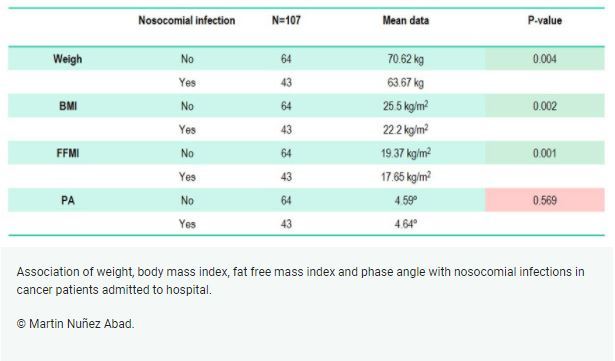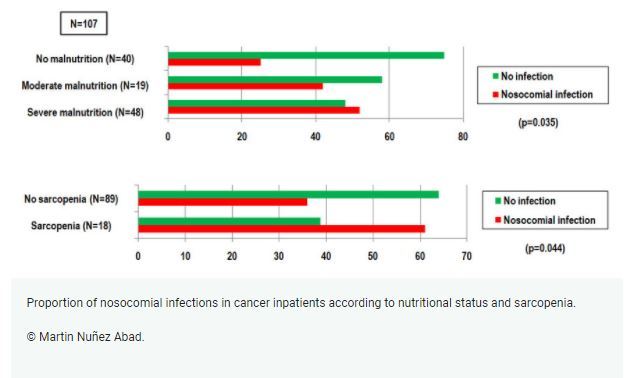Early evaluation of nutritional status is needed to provide nutritional support and decrease risk of malnutrition, sarcopenia and nosocomial infection in cancer patients
ESMO Virtual Congress 2020 Sep 22, 2020
Upon hospital admission for cancer, patients already demonstrated a high prevalence of malnutrition per Global Leadership Initiative on Malnutrition (GLIM) criteria, which was associated with the risk of developing a nosocomial infection (NI) according to findings presented by Dr. Martin Nuñez Abad of the Medical Oncology, Hospital General Universitario Valencia in Valencia, Spain at the ESMO Virtual Congress 2020.
Dr. Nuñez Abad and colleagues investigated the nutritional status in patients hospitalised for cancer to determine the prevalence of malnutrition according to GLIM criteria, and to determine the association between malnutrition and the risk of NI and length of hospital stay.
This prospective observational study was carried out in patients admitted to the Oncology Department of the General University Hospital of Valencia from November 2019 to March 2020. Nutritional status was evaluated within the first 48 hours after admission. The body mass criteria used included the fat free mass index (FFMI) and phase angle (PA), as measured using a bioelectrical impedance (Akern®). Muscle function was evaluated using a Jamar® handgrip. The extent of sarcopenia was measured using the cut-off values established by the European Working Group on Sarcopenia in Older People 2 (EWGSOP2).
At admission, nearly half of the patients had malnutrition
This study included 107 patients with a mean age of 66 years; 66.4% of patients were male, and most (70.1%) patients had advanced disease.
The investigators found that, on admission, 48 (44.9%) patients presented with severe and 19 (17.8%) patients had moderate malnutrition per GLIM criteria. In addition, 77 (72%) patients also presented with dynapenia and 18 (16.8%) patients had sarcopenia.
Regarding other parameters of nutritional status, the mean weight was 67.8 kg, mean BMI was 24 kg/m2, mean FFMI and 18.6 kg/m2 and mean PA was 4.5º in these patients overall.
During a mean hospital stay of 13.9 days, 43 (40.2%) patients developed a NI, which were primarily respiratory tract infections in 26 patients. Patients developing a NI had significantly lower weight, BMI and FFMI than the overall patient cohort (p <0.05 all comparisons), but PA was not lower.

The proportion of infections rose as the nutritional status worsened
NI occurred in 8 of 19 (42.1%) patients with moderate malnutrition and 25 of 48 (52.1%) patients with severe malnutrition compared with 10 infections in 40 (25%) patients without signs of malnutrition (p = 0.035). The incidence of NI was highest in patients with sarcopenia (61.1%), as compared with 36% in the hospitalised patients overall (p = 0.044). [SJ-E2]

The length of hospital stay was prolonged in patients with NI compared to patients overall; the mean length of stay was 18.6 versus 10.8 days (p <0,024).
Length of hospital stay was not found to be related to nutritional status.
Conclusions
According to the authors, the prevalence of malnutrition in patients hospitalised for cancer is high. Malnutrition per GLIM criteria and sarcopenia are associated with a high risk of NI.
The investigators advise that an adequate nutritional evaluation is essential for timely implementation of nutritional support, to avoid malnutrition, sarcopenia and to decrease NI.
No external funding was reported for this study.
This article is a news release from ESMO 2020 Press Meeting. Read the original here.
-
Exclusive Write-ups & Webinars by KOLs
-
Daily Quiz by specialty
-
Paid Market Research Surveys
-
Case discussions, News & Journals' summaries